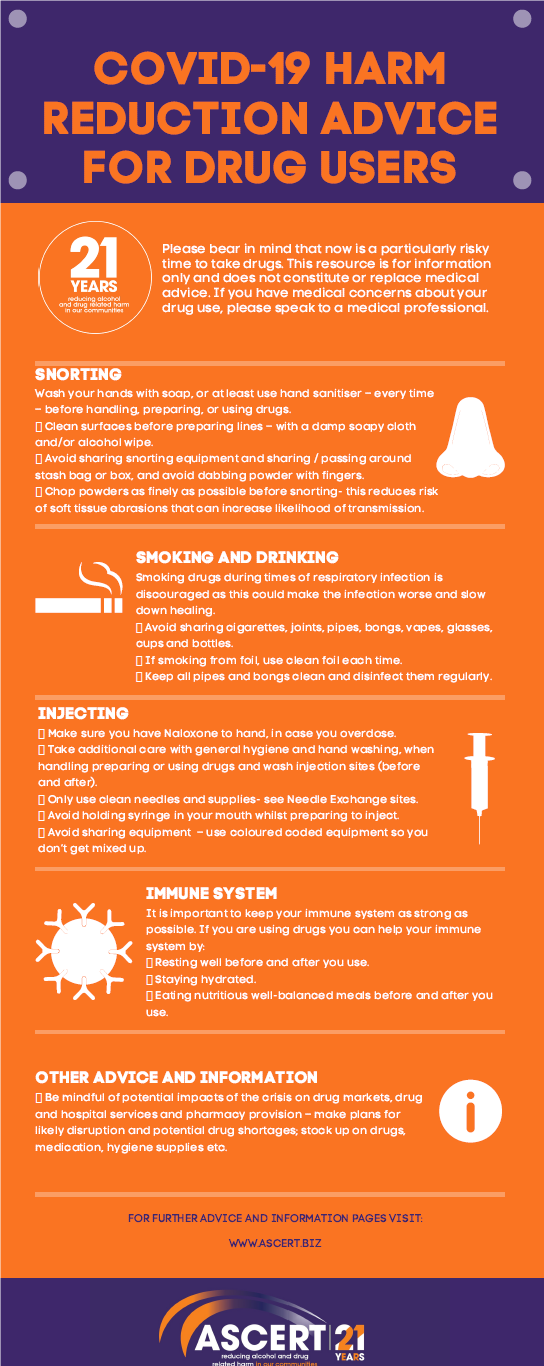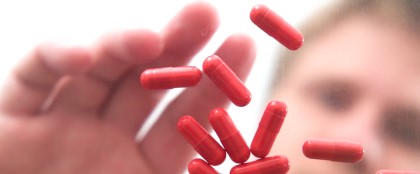The following information has been compiled from advice available from the US Harm Reduction Coalition, Crew2000, Transform Drug Policy Foundation and extern.
All drug use has risks. Please bear in mind that now is a particularly risky time to take drugs. This page is for information only and does not constitute or replace medical advice. If you have medical concerns about your drug use, please speak to a medical professional.
Most drug using behaviours can increase the risks of Covid-19 transmission but basic and sensible precautions can reduce these risks. Everyone should follow existing Covid-19 transmission prevention advice and established harm reduction practice, avoiding close contact with others, being particularly careful about hygiene when preparing or using substances and not sharing drugs or equipment.
The symptoms of coronavirus are:
- a cough
- fever (high temperature)
- shortness of breath
But these symptoms do not necessarily mean you have the illness as the symptoms are similar to other viruses like the cold and flu.
The best ways to prevent spreading the virus are to:
- Cover your mouth and nose with a tissue or sneeze/cough into your elbow – bin any tissues straight away.
- Wash your hands with soap and water often – washing them for at least 20 seconds. When soap and water are not available – use alcohol-based hand sanitiser.
- Try to avoid close contact with people who are unwell and limit your own contact with other people if you suspect any of the symptoms.
- Avoid touching your face if your hands are not clean.
- Clean and disinfect any frequently touched objects and surfaces, including your phone.
People who do not have symptoms may still have the virus and be able to pass it on to others. It is important that we all take care to reduce the spread of viruses.
Some people are more vulnerable to the effects of transmission than others. However EVERYONE has a responsibility to do what they can to prevent spreading the virus. People over 65 and people with certain pre-existing medical conditions (including heart disease, respiratory illness, diabetes, or people who are immuno-compromised) are particularly to vulnerable to coronavirus.

General health advice if you’re taking drugs
It is important to keep your immune system as strong as possible. IF you are using drugs you can help your immune system by:
- Resting well before and after you use
- Staying hydrated
- Eating nutritious well-balanced meals before and after you use
Smoking and drinking
Covid-19 can be spread via saliva, and via hard surfaces, hand to mouth. Inhaling drugs can damage the mouth, throat and lungs and can cause breathing difficulties, wheezing, chest pain and shortness of breath. Smoking drugs during times of respiratory infection is discouraged as this could make the infectio
n worse and slow down healing.
- Avoid sharing cigarettes, joints, pipes, bongs, vapes, glasses, cups and bottles.
- If smoking from foil, use clean foil each time.
- Keep all pipes and bongs clean and disinfect them regularly.
Snorting
- Wash your hands with soap, or at least use hand sanitiser – every time – before handling, preparing, or using drugs.
- Clean surfaces before preparing lines – with a damp soapy cloth and/or alcohol wipe. This is especially important for hard surfaces that come into contact with hands/people – including phone screens, toilets etc.
- Avoid sharing snorting equipment (including spoons, keys etc); use your own straw (different colours to avoid mix ups), or rolled paper (then throw away after use – so avoid using banknotes which are more likely to get re-used).
- Sharing snorting equipment can also spread other viruses (colds and flu), infections, and HepC, so this is sensible longer term harm reduction
- Avoid sharing / passing around stash bag or box, and avoid dabbing powder with fingers
- Chop powders as finely as possible before snorting- this reduces risk of soft tissue abrasions that can increase likelihood of transmission. This (and having a nasal douche after snorting) also reduces likelihood of irritation that can cause runny-nose and sneezing later (people could think you have coronavirus even if you don’t!)
- And no, cocaine most definitely does not kill coronavirus
Injecting
People who use opioids or inject drugs are at greater risk.
- Make sure you have naloxone to hand, in case you overdose.
- Follow established harm reduction guidance to avoid blood borne virus transmission, but take additional care with general hygiene and hand washing, when handling preparing or using drugs.
- Covid-19 infection can compromise the respiratory system – making respiratory failure/crisis more likely in opioid overdose.
- Only use clean needles and supplies. Free, clean needles are available from needle exchange services. If needle exchange services are disrupted, you can buy injecting equipment online.
- Wash injection sites (before and after).
- Avoid holding syringe in your mouth whilst preparing to inject
- Avoid sharing equipment (including needles, filters, containers, spoons and water) – use coloured coded equipment so you don’t get mixed up.
Swallowing
If mixed into a drink, avoid sharing bottles/cups. Make sure it is marked so no one accidentally drinks it and never leave your drink unattended.
Dabbing
- Wash your hands before each ‘dab’.
- Avoid ‘dabbing’ from shared bags of drugs.
Supply
Be mindful of potential impacts of the crisis on drug markets, drug and hospital services and pharmacy provision – make plans for likely disruption and potential drug shortages; stock up on drugs, medication, hygiene supplies etc
Naloxone
There is an elevated risk of COVID-19 transmission from responding to an overdose, not so much from giving naloxone but from giving CPR or putting person in recovery position. Wear gloves and other PPE if possible, only give rescue breaths if you have a barrier device like a pocket mask and keep your face and hands away from the casualty’s mouth as much as possible. Where possible the rescuer should advise all others in the immediate area to stand back at least 2 metres away as the natural curiosity or stress tends to mean people step in close to see what’s going on.
For guidance on naloxone administration during the COVID19 pandemic see https://www.extern.org/administering-naloxone-coronavirus%20
For information on how to get take home naloxone see https://www.publichealth.hscni.net/publications/take-home-naloxone
For details of Needle/Syringe Exchange Scheme locations across Northern Ireland see http://services.drugsandalcoholni.info/treatment-support?f%5B0%5D=field_treatment_and_support_serv%3A112
For further harm reduction information see this pdf produced by the Harm Reduction Alliance https://harmreduction.org/wp-content/uploads/2020/03/COVID19-safer-drug-use-1.pdf
Information on all drug and alcohol support services can be found at www.drugsandalcoholni.info


